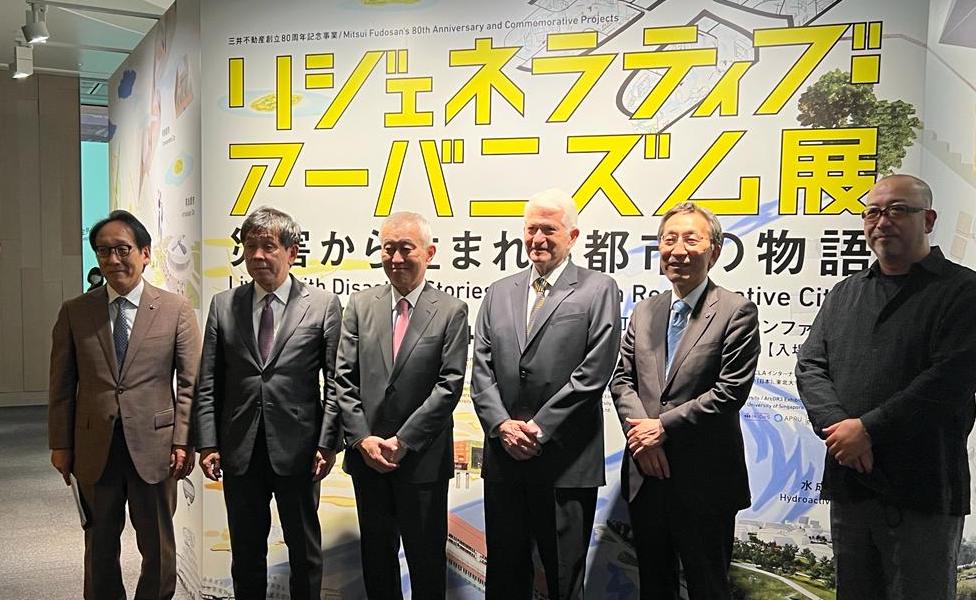Eleven Universities worldwide, led by xLAB at UCLA and the International Research Institute of Disaster Science (IRIDeS) at Tohoku University, present disaster-responsive architecture and urban design.
The exhibition “Regenerative Urbanism Living with Disaster: Stories from Seven Regenerative Cities” held at “Muromachi Mitsui Hall & Conference” at Nihonbashi Muromachi Mitsui Tower from 9 -24 April 2022 was organized by the Architecture and Urban Design xLAB at University of California, Los Angeles (UCLA), the International Research Institute of Disaster Science (IRIDeS), Tohoku University, and the ArcDR3 Exhibition Executive Committee, which was established in connection with the APRU Multi-Hazards Program (*1).
ArcDR3 (Architecture and Urban Design for Disaster Risk Reduction and Resilience) aims to create a disaster-responsive society, which is the goal of the Sendai Framework for Disaster Risk Reduction 2015-2030. It is a joint international project in collaboration with APRU, in which 11 universities (*2) participated and a global partnership with IRIDeS at Tohoku University, xLAB at UCLA, Miraikan, and the National Museum of Emerging Science and Innovation in Japan.
Since 2020, ArcDR3 has been discussing the possibility of how we can respond to disasters in the field of architecture / urban design. With the unique sponsorship of Mitsui Fudosan’s 80th Anniversary and Commemorative Projects, this exhibition has been realized to present the results of its activities.
The exhibition
“Regenerative Urbanism,” the name of this exhibition, is a new paradigm of urban design created by the threat of rapidly increasing disasters due to climate change. It is also an accommodative and forward-looking urban design strategy that aims to realize a civil society that coexists with disasters in the future. At the venue, stories of seven virtual cities will be unfolded to present these visions for the future and the lessons learned from the Great East Japan Earthquake and the various visualized risks surrounding the world.
In the afternoon of April 8th, the day before the exhibition started, a sneak preview was held for the organizers and media, including the Chancellor of UCLA Gene Block, xLAB Prof. Hitoshi Abe, Tohoku University President Hideo Ohno, and Vice President Noriko Okuma, IRIDeS Director Prof. Fumihiko Imamura, Prof. Osamu Murao and Associate Prof. Takako Izumi (International Strategy for Disaster Mitigation Lab), Associate Prof. Maly Elizabeth (International Research Collaboration Office), Prof. Yasuaki Onoda of Graduate School of Engineering, and Prof. Masashige Motoe (concurrently in the field of Spatial Design Strategies Lab) participated.
The tour was conducted by Prof. Abe, who supervised the exhibition and designed the venue, as the invited guests enjoyed the show’s contents. In addition, the reception started with greetings by the Chancellor of UCLA Block, Tohoku University President Ohno, xLAB Prof. Abe, and IRIDeS Director Prof. Imamura. The reception provided the opportunity to interact with participants from various fields.
Symposium and ArcDR3 Forum Vol.4
In celebration of the exhibition launch, the New Visions for Regenerative Urbanism Symposium was hosted as the 4th ArcDR3 Forum on April 9, 2022. Architects, researchers, and experts in various fields from the eleven participating universities of the ArcDR3 network discussed the concepts behind the design studios which were the foundation for the seven explorations of future risk-resilient cities displayed in the seven wells of the exhibition.
The symposium was composed of a “Big Table” and a “Small Table” track, whose non-hierarchical configuration sought to flatten the relationship between speakers and audience and to create an environment that encourages discussion. After opening statements from the university presidents of UCLA and Tohoku University, the Big Table track highlighted the presentations from various backgrounds related to creative design and innovation. In contrast, the Small Table track formed a series of panel discussions focusing on the seven thematic cities: the Archipelagic City, Biophilic City, Archipelagic City, Pyroactive City, Dialogic City, Chronosystemic City, and Nomadic City. The symposium closed with remarks from Mr. Yoshikazu Kitahara of Mitsui Fudosan.
Find out the speakers and the recording of the symposium here.
More Information
- Find out the exhibition overview and organizers here.
- ArcDR3 Initiative at https://xlab.aud.ucla.edu/irides-tohoku-arcdr3/
- News article and website of the ArcDR3 exhibition published by Tohoku University
- News article and website of the ArcDR3 Symposium and the 4th Forum published by Tohoku University
(*1) APRU Multi-Hazards Program: A program run by IRIDeS, Tohoku University, as part of the APRU policy and research areas following the Great East Japan Earthquake. The program aims for collaborative projects and promotes disaster research with multiple universities across the network. The MH program hosts summer programs, annual symposiums and meetings, and leads campus safety development.
(*2) ArcDR3 is a collaborative initiative with National Cheng Kung University, National University of Singapore, Pontifical Catholic University, The University of Hong Kong, The University of Melbourne, Tohoku University, Tokyo University, Tsinghua University, University of California, Berkeley, University of California, Los Angeles, and University of Washington.

